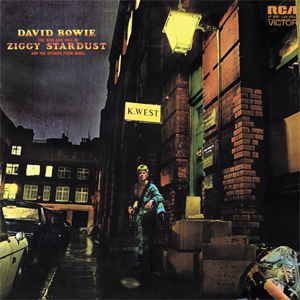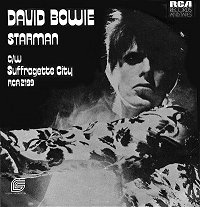
David Robert Jones, known professionally as David Bowie, was an English singer, songwriter, musician, and actor. He is regarded as one of the most influential musicians of the 20th century. Bowie was acclaimed by critics and musicians, particularly for his innovative work during the 1970s. His career was marked by reinvention and visual presentation, and his music and stagecraft had a significant impact on popular music.

The Rise and Fall of Ziggy Stardust and the Spiders from Mars is the fifth studio album by the English musician David Bowie, released on 16 June 1972 in the United Kingdom through RCA Records. It was co-produced by Bowie and Ken Scott and features Bowie's backing band the Spiders from Mars — the guitarist Mick Ronson, the bassist Trevor Bolder and the drummer Mick Woodmansey. It was recorded from November 1971 to February 1972 at Trident Studios in London.

Michael Ronson was an English musician, songwriter, arranger, and producer. He achieved critical and commercial success working with David Bowie as the guitarist of the Spiders from Mars. He was a session musician who recorded five studio albums with Bowie followed by four with Ian Hunter, and also worked as a sideman in touring bands with Van Morrison and Bob Dylan. A classically trained musician, Ronson was known for his melodic approach to guitar playing.

Aladdin Sane is the sixth studio album by the English musician David Bowie, released in the United Kingdom on 19 April 1973 through RCA Records. The follow-up to his breakthrough The Rise and Fall of Ziggy Stardust and the Spiders from Mars, it was the first album he wrote and released from a position of stardom. It was co-produced by Bowie and Ken Scott and features contributions from Bowie's backing band the Spiders from Mars — Mick Ronson, Trevor Bolder and Mick Woodmansey — with the pianist Mike Garson, two saxophonists and three backing vocalists. Recorded in London and New York City between legs of the Ziggy Stardust Tour, the record was Bowie's final album with the full Spiders lineup.

"Suffragette City" is a song by the English singer-songwriter David Bowie. It was originally released in April 1972 as the B-side of the single "Starman" and subsequently appeared on his fifth studio album The Rise and Fall of Ziggy Stardust and the Spiders from Mars (1972). The song was later reissued as a single in 1976, with the US single edit of "Stay" as the B-side, to promote the compilation album Changesonebowie in the UK. Co-produced by Bowie and Ken Scott, it was recorded by Bowie at Trident Studios in London with his backing band the Spiders from Mars, consisting of Mick Ronson, Trevor Bolder and Mick Woodmansey, at a late stage of the album's sessions. The song was originally offered to English band Mott the Hoople, who declined it and recorded Bowie's "All the Young Dudes" instead. It is a glam rock song that is influenced by the music of Little Richard and the Velvet Underground. The lyrics include a reference to Anthony Burgess' novel A Clockwork Orange and the lyric "Oooohh wham bam, thank you, ma'am".

"Rebel Rebel" is a song by the English singer-songwriter David Bowie. It was released in the UK on 15 February 1974 by RCA Records as the lead single from the album Diamond Dogs. Written and produced by Bowie, the song is based around a distinctive guitar riff reminiscent of the Rolling Stones. Cited as his most-covered track, "Rebel Rebel" has been described as Bowie's farewell to the glam rock movement that he had helped initiate, as well as being a proto-punk track. Two versions of the song were recorded: the well-known UK single release and the shorter US single release, which featured added background vocals, extra percussion and a new arrangement.

"Starman" is a song by the English musician David Bowie. It was released on 28 April 1972 by RCA Records as the lead single of his fifth studio album The Rise and Fall of Ziggy Stardust and the Spiders from Mars. Co-produced by Ken Scott, Bowie recorded the song on 4 February 1972 at Trident Studios in London with his backing band known as the Spiders from Mars – comprising guitarist Mick Ronson, bassist Trevor Bolder and drummer Mick Woodmansey. The song was a late addition to the album, written as a direct response to RCA's request for a single; it replaced the Chuck Berry cover "Round and Round" on the album. The lyrics describe Ziggy Stardust bringing a message of hope to Earth's youth through the radio, salvation by an alien 'Starman'. The chorus is inspired by "Over the Rainbow", sung by Judy Garland, while other influences include T. Rex and the Supremes.

"Rock 'n' Roll Suicide" is a song by the English singer-songwriter David Bowie, originally released as the closing track on the album The Rise and Fall of Ziggy Stardust and the Spiders from Mars on 16 June 1972. Co-produced by Ken Scott, Bowie recorded it with his backing band the Spiders from Mars – comprising Mick Ronson, Trevor Bolder and Mick Woodmansey. It detailed Ziggy's final collapse like an old, washed-up rock star and, as such, was also the closing number of the Ziggy Stardust live show. In April 1974 RCA issued it as a single.
"Five Years" is a song by the English musician David Bowie, released on his 1972 album The Rise and Fall of Ziggy Stardust and the Spiders from Mars. Co-produced by Bowie and Ken Scott, it was recorded in November 1971 at Trident Studios in London with his backing band the Spiders from Mars − comprising Mick Ronson, Trevor Bolder and Mick Woodmansey. As the opening track on the album, the song introduces the overarching theme of the album: an impending apocalyptic disaster will destroy Earth in five years and the being who will save it is a bisexual alien rock star named Ziggy Stardust. While the first two verses are told from a child narrator's perspective, the third is from Bowie's, who addresses the listener directly. As the track progresses, it builds intensity, before climaxing with strings and Bowie screaming the title.

"Moonage Daydream" is a song by the English singer-songwriter David Bowie. It was originally recorded in February 1971 at Radio Luxembourg's studios in London and released as a single by his short-lived band Arnold Corns in May 1971 on B&C Records. Bowie subsequently re-recorded the song later that year with his backing band the Spiders from Mars—Mick Ronson, Trevor Bolder and Mick Woodmansey—for release on his 1972 album The Rise and Fall of Ziggy Stardust and the Spiders from Mars. The re-recording was co-produced by Ken Scott and recorded at Trident Studios in London in November 1971. The re-recording is a glam rock song that uses melodic and harmonic hooks, as well as percussion and guitar influenced by heavy metal. On the album, the song directly introduces the character Ziggy Stardust, who describes himself as a bisexual alien rock superstar who will save the Earth from the impending disaster described in the opening track "Five Years". It features saxophone played by Bowie and a guitar solo and string arrangement by Ronson.

"Hang On to Yourself" is a song written by the English singer-songwriter David Bowie in 1971 and released as a single with his band Arnold Corns. A re-recorded version, recorded in November 1971 at Trident Studios in London, was released on the album The Rise and Fall of Ziggy Stardust and the Spiders from Mars. The main riff is representative of glam rock's influence as a bridge between 1950s rock and roll, specifically rockabilly, and the punk to come; it draws on rockabilly influences such as Eddie Cochran, in a way that would influence punk records such as "Teenage Lobotomy" by Ramones.

David Bowie (1947–2016) held leading roles in several feature films, including The Man Who Fell to Earth (1976), Just a Gigolo (1978), Merry Christmas, Mr. Lawrence (1983), The Hunger (1983), Labyrinth (1986), The Linguini Incident (1991), and Twin Peaks: Fire Walk with Me (1992). Films in which he appeared in a supporting role or cameo include The Last Temptation of Christ (1988) and Zoolander (2001).

"Ziggy Stardust" is a song written by the English singer-songwriter David Bowie for his 1972 album The Rise and Fall of Ziggy Stardust and the Spiders from Mars. Co-produced by Bowie and Ken Scott, he recorded it at Trident Studios in London in November 1971 with his backing band the Spiders from Mars—comprising Mick Ronson, Trevor Bolder and Mick Woodmansey. Lyrically, the song is about Ziggy Stardust, a bisexual alien rock star who acts as a messenger for extraterrestrial beings. The character was influenced by English singer Vince Taylor, as well as the Legendary Stardust Cowboy and Kansai Yamamoto. Although Ziggy is introduced earlier on the album, this song is its centrepiece, presenting the rise and fall of the star in a very human-like manner. Musically, it is a glam rock song, like its parent album, and is based around a Ronson guitar riff.
"Watch That Man" is a song by the English musician David Bowie, the opening track on the album Aladdin Sane from 1973. Its style is often compared to the Rolling Stones' Exile on Main Street. The mix, in which Bowie's lead vocal is buried within the instrumental sections, has generated discussion among critics and fans.

The Ziggy Stardust Tour was a 1972–73 concert tour by the English singer-songwriter David Bowie, to promote the studio albums Hunky Dory, The Rise and Fall of Ziggy Stardust and the Spiders from Mars and Aladdin Sane. Bowie was accompanied by his backing group, the Spiders from Mars, and integrated choreography, costumes and make-up into the live shows to make them a wider entertainment package. The tour generated significant press coverage, drawing positive reviews and launching Bowie to stardom.
Friars Aylesbury is a music club that runs in Aylesbury, Buckinghamshire, England. It opened in 1969 but closed down twice, once in 1970 for a period of nine months and again in 1984 for a period of twenty-five years. Friars Aylesbury reopened in June 2009 to tie in with its fortieth anniversary.

On 10 January 2016, the English musician David Bowie died at his Lafayette Street home in New York City, having been diagnosed with liver cancer 18 months earlier. He died two days after the release of his twenty-sixth and final studio album, Blackstar, which coincided with his 69th birthday.

Ziggy Stardust is a fictional character created by English musician David Bowie, and was Bowie's stage persona during 1972 and 1973. The eponymous character of the song "Ziggy Stardust" and its parent album The Rise and Fall of Ziggy Stardust and the Spiders from Mars (1972), Ziggy Stardust was retained for Bowie's subsequent concert tour through the United Kingdom, Japan and North America, during which Bowie performed as the character backed by his band The Spiders from Mars. Bowie continued the character in his next album Aladdin Sane (1973), which he described as "Ziggy goes to America". Bowie retired the character in October 1973 after one final show at The Marquee in London.
















